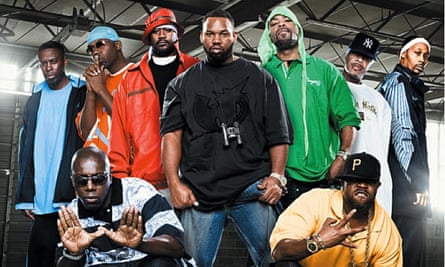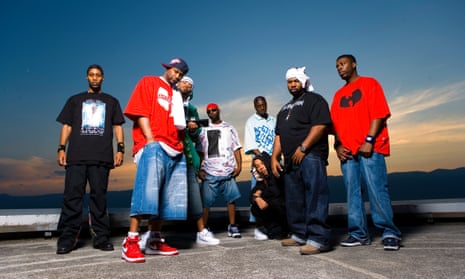While Public Enemy may have the politically conscious audience vote, and NWA own hip-hop’s rebel yell, for most rap fans, no group from the genre’s late 80s and early 90s heyday will ever match the effortlessly charismatic and perpetually chaotic Wu-Tang Clan. The Staten Island nine-piece’s obsessions with kung fu and weed may have helped make them bedroom favourites for teenagers around the world, but this belies a world-building ambition and cultural impact that sees them regularly cited as the most influential and beloved rap group of all time. Years of infighting, and unlikely hit books such as 2010’s The Tao of Wu, an outline of the philosophy of the RZA, the group’s de facto leader (or “dictator”, as fellow member U-God put it in his memoir, Raw, earlier this year), only add to their aura.
It’s also hard to think of many albums from the 90s that still sound as fresh and robust, as brilliant at myth-making as their debut, Enter the Wu-Tang (36 Chambers). It remains irresistible for the sheer wit and personality of its MCs, its timeless hooks, and beats that somehow refuse to be worn down by the passage of time – it is a cohesive whole so much greater than the sum of its uncountable moving parts, human and sonic.
Albums have become ever less valued in the age of Spotify, and perhaps this is partly why close critical attention to the LP format is becoming a lost art, but author and former (British) hip-hop label boss Will Ashon makes a strong case for it in Chamber Music, citing the “occult and obscure” encryptions, references and symbols of the Wu-Tang’s epochal debut.
He takes us on a high-concept journey far beyond the recording, sound and impact of the record itself, across 36 themed “chambers” (chapters), exploring everything from the African precursors to battle rap, from the story of crack cocaine in America to the kung fu films that inspired the Wu so much, from the group’s name downwards. It is deliberately not a conventional “album biography”, and Ashon’s proudly lateral approach and self-referential tone may irritate some. “Some of these experiments interrelate, some don’t. Some teach us new things... others less so. Some are baffling, frankly,” he writes, explaining Chamber Music, 30-odd pages in. Which is honest, if a little grating.
Some chapters take an oblique concept – there is a learned account of the “thrilling, exhilarating” vulgarity of jazz saxophone “honkers”, and the “squeal” as an emancipatory black vocal noise – and proceed through 15 or so pages before getting anywhere near to explaining their connection to the group or the album in question. Others meander far from the “text” of the album to the point where we are in danger of forgetting its power. Do we really need a history of the Shinnecock Native Americans on the basis that a former chief of the tribe “may” be related to three of the group?
For the most part, though, it’s hard to resist the sparky intellectual game-playing, even when it over-reaches, because Ashon is having such fun with it. Does it help us understand the Wu to know that RZA is said to have first convened the crew in a house on Morningstar Road (on Staten Island), that “morning star” is “lucifer” in Latin, and that Robert Johnson’s mythical deal with the devil is part of the blues lineage of modern hip-hop? Not really – but it’s amusing watching Ashon make these leaps. Indeed, this kind of nerdiness is what the Wu demand of their most passionate fans: a delving into the meaning of every soundbite sample, however subtle, an unpacking of elaborate wordplay, every apparently casual pun, every change in vocal tone or pop-culture reference.

Ashon argues persuasively that as a culture that emerged in a nation built on slavery, and one that continues to impoverish, incarcerate and brutalise its black population, hip-hop is in a unique African American tradition, where meanings are constantly occluded or resignified. Because there was “no room for an honest exchange of views with a master”, there evolved “a shadow system” of coded meanings, where, for example, Yoruba religious practices were encased in the rituals of the Catholic church, where the Christian hymns of the master were “rebuilt and repurposed” (or remixed) as spirituals; “until, eventually, we arrived at a point where almost all of us know that ‘wicked’ can carry a very different meaning from the same word in the King James Bible”. In this context, we have to learn how to read the signs, however arcane they may be.
It’s a shame there isn’t more of it, because when Ashon does turn directly to the Wu’s music, his passion is unmissable: enthusing about the vitality of U-God and Method Man’s “big, ragged breaths”, or describing the manic, piano-led track Da Mystery of Chessboxin’ as “a high-wire comedy act, an exercise in... rescuing victory from the jaws of defeat”.
Chamber Music is meant to be a collage of disparate but enticing fragments, like Wu-Tang’s music – rich with sampling, allusions, oblique references and confusing tangents. It’s ambitious, flawed and a lot more fun than any straight album biography would be.




Comments (…)
Sign in or create your Guardian account to join the discussion